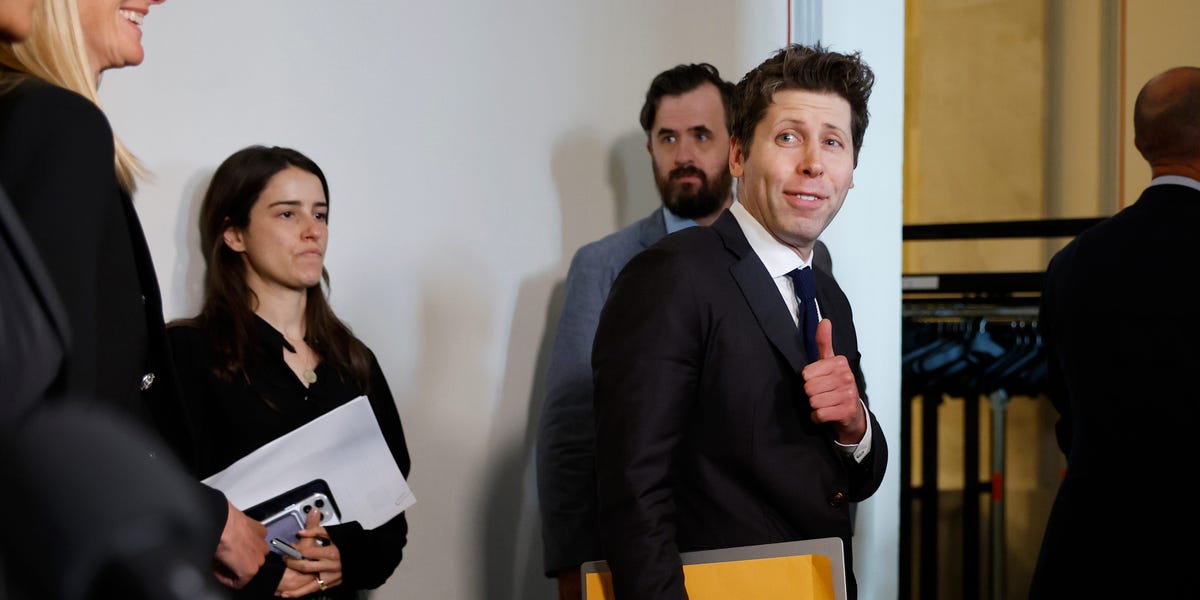The ouster of Sam Altman, which thrust OpenAI into chaos and infuriated most of its workforce, has presented an unexpected opportunity to the ChatGPT parent’s biggest competitors.
“I think it opens the doors as it unseats today’s winner,” Nathan Benaich, general partner at AI investor Air Street Capital, told Business Insider. “The gorilla is gone for the moment.”
The fallout will be welcome news to competing startups in the US like Anthropic, Cohere, and Hugging Face who rival OpenAI’s development of foundational models and open-source research. Similarly in Europe, contenders like Mistral and Aleph Alpha, both building their own foundational models, will be buoyed by the crisis.
Altman’s dismissal leaves OpenAI’s disgruntled talent the target of its competitors while also emboldening venture capitalists to back rivals to a company that seemed an unstoppable force less than a week ago, investors and founders told BI.
OpenAI’s customers are already considering a switch to Anthropic, Microsoft, and Google, The Information reported.
An in-demand talent pool
“Many previously poorly understood secrets will be more widely disseminated across the ecosystem,” one European AI founder who spoke on the condition of anonymity said.
The majority of those secrets are likely to end up at Microsoft as many of OpenAI’s staffers, 95% of whom have threatened to quit, plan to follow Altman. Though there have been some efforts to stem that flow, not least from Salesforce CEO Marc Benioff.
In the case that staffers choose not to go to Microsoft or stay at OpenAI, “other big labs will soak them up,” Benaich said. Still, it may be difficult for European competitors such as Mistral or Aleph Alpha to hire the US-based talent, largely because of distance and remuneration, he added.
But European competitors can still benefit from OpenAI’s implosion. The startup had been on an uninterrupted run for the past year, said EarlyBird VC partner and Aleph Alpha investor Andre Retterath. The recent developments not only distract the company but have potentially punctured its key talent base — who will likely go on to “create new companies or join competitors,” Retterath said.
Global Founders Capital partner Mariam Pettit agreed, insisting that the caliber of OpenAI’s engineers, developers, and business executives meant that the creation of a batch of startups spearheaded by an OpenAI mafia was likely.
The turmoil at OpenAI has also galvanized both AI founders and investors in Europe.
“The European founders I know are more confident in themselves after seeing what seems like a complete mess up from OpenAI, so they’re more willing to think at a bigger scale which then means more serious competition,” the founder said
“Investors I know are more excited to invest because they don’t feel like they’ve missed the train anymore. OpenAI seemed invincible before, but now that they aren’t, it’s easier to see how other companies could catch up.”
Business model limitations
OpenAI first operated on a non-profit basis, before pivoting to a “capped profit” model in 2019. Investors are doubtful about the long-term sustainability of its unusual corporate structure.
“There’s a reason you don’t stray from industry standard,” Andrew Scott, partner at venture capital firm 7percent told BI. “Nonprofits simply cannot ever work; history has proven the for-profit corporation as the only way to align the whole team toward a common goal.”
Albion VC partner David Grimm said the destabilization of OpenAI could mean its non-profit model, put in place to ensure the safety of humanity throughout the development of AI, could be diluted.
“This won’t slow down OpenAI but it could open up more space and opportunities for other startups to look at AI safety,” Grimm said.
It’s a risky model for a startup that bleeds as much cash as OpenAI, particularly since the development of GPT-3.
The company’s top expenditure, besides employee salaries, is manually cleaning and sourcing the data they use to train their models, a European VC said.
“Imagine like the world’s most advanced tech company is still spending the second highest costs on something to do with manual data tearing and integration and verification,” they added.
Competitors such as Cohere, Google Cloud, and Anthropic aim to benefit from the crisis by hovering up the corporate clients who plan to depart OpenAI.
“The old mantra of ‘move fast and break things’ has much higher stakes in the world of AI,” Rebecca Gorman, founder of AI safety startup Aligned AI, said.
“And enterprise clients are looking for technology they can rely on and trust.”
Read the full article here





